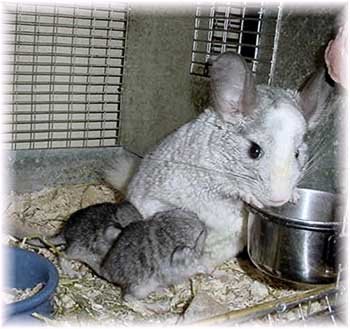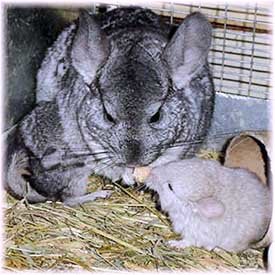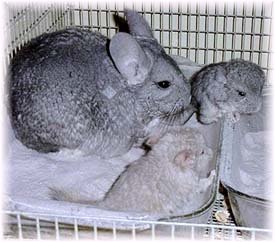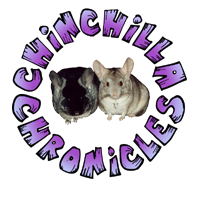
The importance of pre and post natal care is paramount to both the developing foeti and newborn kits as well as for the female during pregnancy and whilst lactating. Without certain minerals and vitamins both will suffer health issues and the developing foeti can be born with a multitude of health problems.
PRE NATAL CARE FOR CHINCHILLAS
In animal studies it has been proven that diet, vitamin and mineral intake and glucose levels (sugar levels in blood) prior to the female ovulating and conceiving have long term effects on foetal growth and adolescent/adult disease.
It must therefore be mentioned that the expectant female should be in optimum health before breeding and be of a good weight (500-700 grams) in order to produce the healthiest of offspring. Any breeding chinchilla that already carry an underlying health issue must not be bred together to prevent the ailment being passed on to the future chinchillas.
The expectant female's diet is of utmost importance both pre and post partum. Before the kits are born, the female should be supplied some extra supplementation that continues until her kits are weaned.
It is paramount you fully understand the actions of certain vitamins and minerals as some can cause devastating effects if not provided in the correct quantity during foetal development. For example, high levels of vitamin A can contribute in birthing defects in the unborn and an incorrect calcium:phosphorus ratio can lead to bone deformities.
Vitamins And The Relation To Chinchilla Disease is a printed booklet that includes all the essential vitamins a pregnant chinchilla requires and also informs the reader of cautions to be maintained if a female is pregnant or lactating. The booklet accompanies Minerals And The Relation To Chinchilla Disease as without minerals, vitamins cannot function. Both booklets are a great source of information to any owner of an expectant chinchilla to help understand the fundamental nutritional needs and the benefits/deficiencies a lack of a specific vitamin/mineral can cause.

Nutrition is paramount both pre and post partum as without appropriate nutrition a pregnant female will not be able to supply her own levels of need as well as supplying vital minerals and vitamins through to the developing foeti.
An expectant female must be handled with caution during her pregnancy as any accidents such as dropping her or holding her up by her hind legs can cause a spontaneous miscarriage or foetal deformities. The female should also remain calm at all times and within her normal home environment. Any sudden changes or stressful situations during this stage can cause the female to miscarry or progress into premature delivery.
The cage sanitation must be of utmost cleanliness both pre and post partum to prevent any fungal or bacterial infections and also promote good health and well-being in both the chin-mum and her offspring.
As the delivery date looms, it is wise to gently examine the female to ensure her mammary glands are clear, dry and uninfected. Any problems with the female's teats, will cause unnecessary problems after the kits are born and ready to feed.
The male should remain in the cage at all times unless the female begins to show signs of irritation or aggression, after which he must be removed and placed in another cage next to the female.
POST NATAL CARE FOR CHINCHILLAS
Extra care must also be given to the chin-mum as she nurses her kits and regains her strength. Ensure the  environment is stress free and quiet so she can rest whenever she wants to. It is a good idea it throw a light sheet over the cage for extra security and ensure there is a small peep hole so the chin-mum can look out if she chooses to.
environment is stress free and quiet so she can rest whenever she wants to. It is a good idea it throw a light sheet over the cage for extra security and ensure there is a small peep hole so the chin-mum can look out if she chooses to.
It is sometimes a good idea to re-house the male during this time not only to provide complete rest to the chin-mum but also to prevent 'back breeding'. Back breeding can occur for up to 10 days after a female has borne her litter and is highly inadvisable due to the strain on the female's system to produce adequate amounts of nutrition for not only her own needs but also the needs of her current litter and her developing foeti. The male can remain in a separate cage right next to the maternal home and be allowed to interact with the family when playing outside of the cage environment (although caution should still be maintained during this time against back breeding when the chin-parents meet).
The female should be gently examined after birth to ensure there are no further foeti within the uterus and the kits gently examined and weighed to ensure there are no deformities and they are of good weight.
The female's teats should be carefully checked to ensure milk flow production is unhindered and there is no soreness or cracks developing. A female should be in full milk flow within 3 days of her kits being born during which time a small amount of milk is available, which also carries vital antibodies to the kits to aid their developing immune and digestive systems.
 Provide a dust bath once you have noticed the vaginal opening of the chin-mum has completely reclosed thus preventing any internal infections.
Provide a dust bath once you have noticed the vaginal opening of the chin-mum has completely reclosed thus preventing any internal infections.
During nursing it is particularly important to make sure the chin-mum is receiving the correct nutrients, especially calcium for good bone strength and teeth maintenance. Providing a probiotic such as Avipro Plus on a daily basis can help replenish lost minerals and vitamins and also contains good bacteria to keep the female's gut in good flora.
Examine and weigh the chin-mum as soon as the kits are born and keep a record. Kits may loose a couple of grams within the first 24 hours whilst waiting for the mother's milk to flow freely but after that they must increase at a rate of 1-3 grams per day. If you detect any abnormal occurrences, contact your veterinary surgeon to rule out any underlying health issues and hand feed any kits that need extra nourishment.
The Chinchilla A-Z Health & Sickness Bible is an amazing ebook that fully discusses pre and post natal ailments and is an 'invaluable' source especially with newborns. The ebook discusses over 150+ different illnesses a chinchilla of ANY age can acquire and is a 'must-have' A-Z Health & Sickness Bible every chinchilla owner should own!
Read More...

Pre and post natal care is the chinchilla owner's responsibility. A female must be provided the best possible care you can offer during this time not only for all the chinchilla's health but also to ensure you are bringing the most healthiest of offspring into the world!




 environment is stress free and quiet so she can rest whenever she wants to. It is a good idea it throw a light sheet over the cage for extra security and ensure there is a small peep hole so the chin-mum can look out if she chooses to.
environment is stress free and quiet so she can rest whenever she wants to. It is a good idea it throw a light sheet over the cage for extra security and ensure there is a small peep hole so the chin-mum can look out if she chooses to. Provide a dust bath once you have noticed the vaginal opening of the chin-mum has completely reclosed thus preventing any internal infections.
Provide a dust bath once you have noticed the vaginal opening of the chin-mum has completely reclosed thus preventing any internal infections.